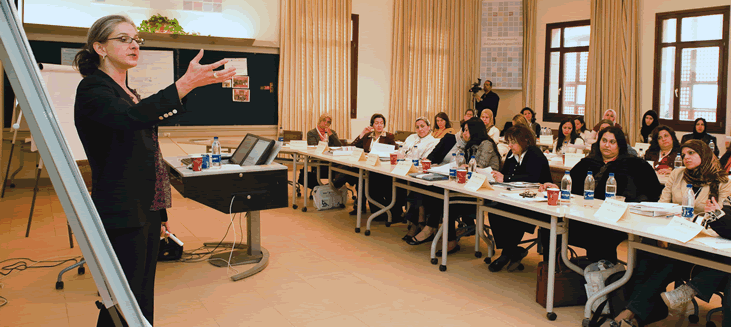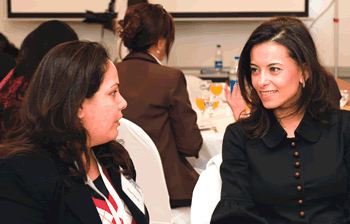
Top: WEL participants in class; bottom: with AUC Trustee Dina Powell
Wishing Women WEL
As part of the 10,000 Women global initiative, AUC is giving
underserved women in the region a business education
By Jeffrey Bellis
Photos by Ahmad El-Nemr
When the funding for her
small business was cut
after two years, Howayda
El Demerdash hit a dead end. As the
owner of Teach Right, a business that
provides educational services by
training Egyptian teachers, she found
herself in a serious predicament.“The
market is very challenging, and we are
facing so many problems,” said El
Demerdash.“There are no regulations
that would require schools to train
their teachers.”
El Demerdash knew that she needed
to improve her skills in order to run a
successful service.Today, she is one of
34 women representing the first cohort
of graduates of AUC’s Women’s
Entrepreneurship and Leadership
(WEL) program.
The program is part of the 10,000
Women global initiative funded by
Goldman Sachs Inc. and Goldman
Sachs Charitable Fund.The initiative
provides underserved women,
predominantly in developing and
emerging markets, with a business
and management education by
partnering universities in the United
States and Europe with business
schools in developing countries.The
goal is to train 10,000 women over
the next five years at a total cost of
$100 million.AUC partnered with
the Wharton school of the University
of Pennsylvania, one of the top
business schools worldwide.The fiveweek
WEL program is the initiative’s
only program in the Middle East,
drawing its students from throughout
the Arab region including Palestine,
Jordan and Iraq.
“The potential for women is
amazing,” said Maha ElShinnawy,
management professor and director of
the WEL program in the Middle East,
noting that 18 percent of businesses in
Egypt on the micro, small and
medium levels are owned by women,
but impediments such as financing
and education prevent that number
from rising. “After conducting a needs
assessment that demonstrated to us the
educational needs of women in the
region, we custom-designed the
program to fit those needs, alleviating
obstacles that hinder women’s
businesses and granting better access
to education, financing and a network
of mentors.”
Women selected for the WEL
program all manage their own
businesses, have university degrees and
are fluent in English. Participants were
selected according to financial need
and proven ambition, and those
enrolled in the program are taking part
in a rigorous curriculum that includes
connectivity to mentor networks.Their
training incorporates professional
leadership management and
entrepreneurial skills, including
marketing, accounting, market research,
accessing capital, writing a business
plan and strategic planning.The fiveyear
goal of the program is to give 500
women from Egypt and the Arab
region a business education to allow
their businesses to grow and eventually
add to their local economies.
“It is a great opportunity for the
Wharton school to be doing a project
like this in the Arab world,” said Mauro
Guillen, faculty director of the program
at Wharton.
Meeting with the first cohort of
program participants in Egypt,AUC
Trustee Dina Powell, managing
director and global head of corporate
engagement at Goldman Sachs, said she
was pleased and humbled.“These are
34 amazing women from throughout
the Middle East, and I am particularly
proud of them as an Egyptian-
American,” she noted, adding that the
distinctiveness of the program lies in
being tailored to the needs of women
entrepreneurs in the region.“This
program wasn’t developed in New
York. It was developed as a specialized
case for Egypt and the Middle East.”
“I hope to be able to pass
on what I’ve learned to
my family and to other
women like me ––
women who want to be
successful leaders.”
 Powell explained that the 10,000 Women initiative was established when Goldman Sachs viewed United
Nations reports that saw a social and
economic multiplier effect on
economies and communities with
greater female labor-force
participation.The initiative, launched
in March 2008, invests in a largely
untapped yet significant resource ––
the exponential power of women as
Powell explained that the 10,000 Women initiative was established when Goldman Sachs viewed United
Nations reports that saw a social and
economic multiplier effect on
economies and communities with
greater female labor-force
participation.The initiative, launched
in March 2008, invests in a largely
untapped yet significant resource ––
the exponential power of women as
entrepreneurs and managers.
For participants like El Demerdash,
taking part in the program is exciting,
albeit a little daunting.“The classes
have been very good so far,” she said.
“There are so many new concepts; I’m
not sure I’ll be able to do everything
I’ve learned in those five weeks.”
Ahmad El-Nemr
To Rana Habash, a Palestinian
entrepreneur with an environmental
consultation business, participating in
the program represents a professional
turning point. For more than 10 years,
she has done consulting work for
various industrial firms and
international agencies including the
United Nations Development
Programme and the World Bank.“I
joined this program to learn
accounting, managerial skills, how to
market my business, and putting
strategies and plans into action in the
short and long term,” she said. “The
program is providing a sustainable
service in that there is a mentoring
period after the courses end. ...Thanks
to everyone who shared to make this
program see the light, and for us ––
Palestinian women –– it gave us a
great opportunity at this critical time
of our lives.”
Echoing the same sentiment, Hend
Zayed, a jewelry designer from Egypt,
noted how WEL has helped her
develop a new holistic attitude at
work.“I discovered I don’t have to do
and supervise everything on my own,”
she said.“From the very first week, I
learned how to reconstruct my
personality and way of thinking. … I
hope to be able to pass on what I’ve
learned to my family and to other
women like me –– women who want
to be successful leaders.”
Classes for the second and third
cohorts will take place in May and
June 2009, respectively. For more
information, visit
www1.aucegypt.edu/welprogram or
e-mail welapply@aucegypt.edu.
WEL Participants in Class